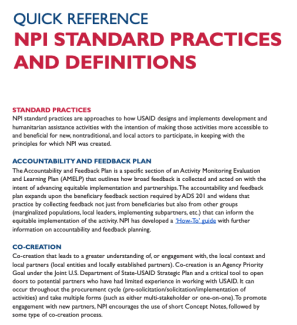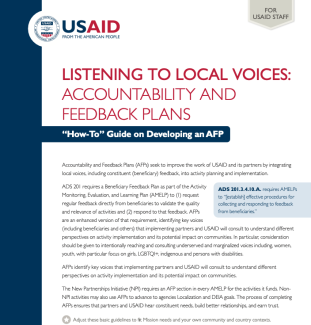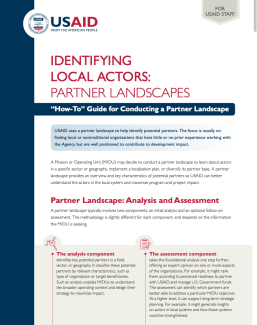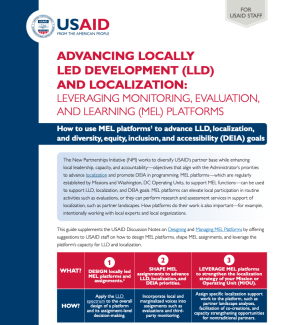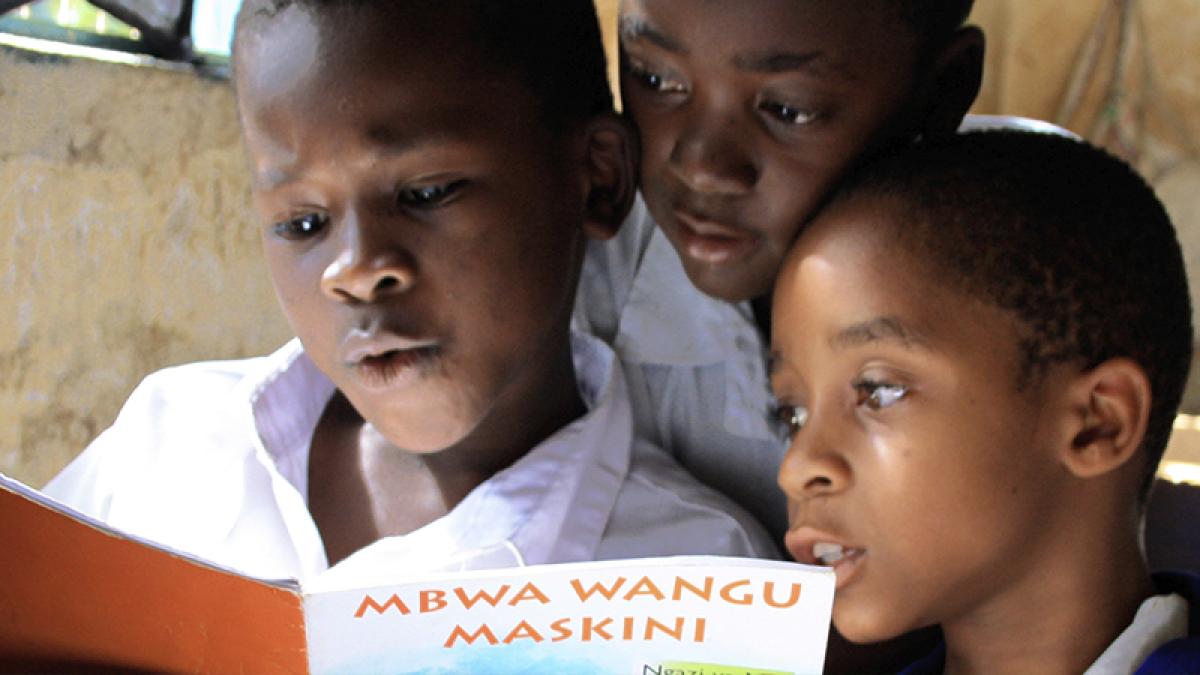
The New Partnerships Initiative (NPI) diversifies USAID’s partner base by expanding opportunities for new, nontraditional, and local partners to work with USAID. Through NPI, the Agency promotes local leadership, seeks innovative approaches to fostering inclusive and sustainable development, and encourages new sources of funding to sustain partnership and scale impact.
NPI Standard Practices
NPI standard practices are approaches to how USAID designs and implements development and humanitarian assistance activities with the intention of making those activities more accessible to and beneficial for new, nontraditional, and local actors to participate, in keeping with the principles for which NPI was created.
- The Accountability and Feedback Plan is a specific section of an Activity Monitoring Evaluation and Learning Plan (AMELP) that outlines how broad feedback is collected and acted on with the intent of advancing equitable implementation and partnerships. The accountability and feedback plan expands upon the beneficiary feedback section required by ADS 201 and widens that practice by collecting feedback not just from beneficiaries but also from other groups (marginalized populations, local leaders, implementing subpartners, etc.) that can inform the equitable implementation of the activity. NPI activities involving traditional partners in a subaward arrangement are required to include subaward recipients as a source of feedback to advance inclusion of local voices and enhance accountability to affected communities. NPI has developed a ‘How-To’ guide with further information on accountability and feedback planning.
- Co-creation is an increasingly adopted USAID practice that enhances understanding and engagement with the local context and local partners (local entities and locally established partners). It can occur throughout the procurement cycle (pre-solicitation, solicitation, or implementation of activities) and take multiple forms (such as either multi-stakeholder or one-on-one). To promote engagement with new partners, NPI encourages the use of multi-phase applications with Concept Notes, followed by some type of co-creation process that informs the Final Application or Award.
- Subawards are a key component of NPI’s approaches to diversifying partnerships and advancing locally led development. As USAID embarks on Agency-wide goals to place local actors in the lead of planning, designing, implementing, or evaluating at least 50 percent of programming by 2030, NPI’s accumulated experience with regards to subawards is as timely as ever. NPI’s approach to subawarding primarily focuses on what are known as mentoring awards, in which a prime awardee commits to subawarding 50 percent or more of their award to local partners. One of the ways that these prime awardees elevate the role of local subawardees and local communities is through their Accountability and Feedback planning (see above), but NPI has compiled additional guidance on subawards that can inform design teams as well as contracting and agreement officers who manage awards.
- Enhanced local capacity strengthening can be invaluable for USAID partners of all kinds, including local entities and locally established partners. NPI, in collaboration with other offices across the Agency, have championed the rollout of an enhanced approach to organizational capacity strengthening and Agency-wide collection of standard organizational capacity strengthening data. While USAID previously measured local capacity of organizations based on an organization’s ability to receive and manage federal funding, NPI has promoted measuring success by an organization’s ability to achieve and sustain demonstrable outcomes. Refer to the Local Capacity Strengthening Policy landing page as well as the CBLD-9 Capacity Building Indicator Resource Page for further details.
- Refinement Period during which the award recipient and the USAID further refine and adapt the activity design, technical approaches, and theory of change (TOC) to improve the impact and sustainability of results. NPI envisions the initial Refinement Period Phase to last approximately 3-12 months, depending on the needs of the activity, context, and partner. NPI has designed a ‘How-To’ Guide on the use of refinement periods for consideration in activity design and awardmaking.
NPI Definitions
Here are several key terms that define the parameters of NPI.
New Partner: An individual or organization that has not received any funding from USAID as a prime partner over the last five years.
Nontraditional Partner: Organizations that have received less than $25 million in direct or indirect awards from USAID over the past five years. Nontraditional partners include New and Underutilized Partners (NUPs), a term still used in technical documents such as solicitations, and all local entities, irrespective of the amount of funding they have received; the threshold does not apply to them.
Local Entity: An individual or organization that:
- Is legally organized under the laws of a country that is receiving assistance from USAID;
- Has its principal place of business or operations in a country receiving assistance from USAID;
- Is majority-owned by individuals who are citizens or lawful permanent residents of a country receiving assistance from USAID; and
- Is managed by a governing body, the majority of whom are citizens or lawful permanent residents of a country receiving assistance from USAID.
Locally Established Partner (LEP): A U.S. or international organization that works through locally led operations and programming models. LEPs:
- Have maintained continuous operations in-country for at least five years and materially demonstrate a long-term presence in a country through adherence or alignment to the following:
- Local staff comprises at least 50% of office personnel;
- Maintenance of a dedicated local office;
- Registration with the appropriate local authorities,
- A local bank account; and
- A portfolio of locally implemented programs.
- Have demonstrated links to the local community, including:
- If the organization has a governing body or board of directors, then it must include a majority of local citizens (in the host country, this is not required);
- A letter of support from a local organization to attest to its work; and
- Other criteria that an organization proposes to demonstrate its local roots.
Leverage: Significant resources mobilized from non-U.S. Government sources. Under NPI, USAID seeks to mobilize resources of other actors on a 1:2 or greater basis (i.e., 50 percent of the proposed value of the award). Leveraged resources may include grants or awards from non-U.S. Government organizations and other donor governments. Leverage under NPI excludes in-kind contributions with the exception of intellectual property or volunteer hours from third parties.

